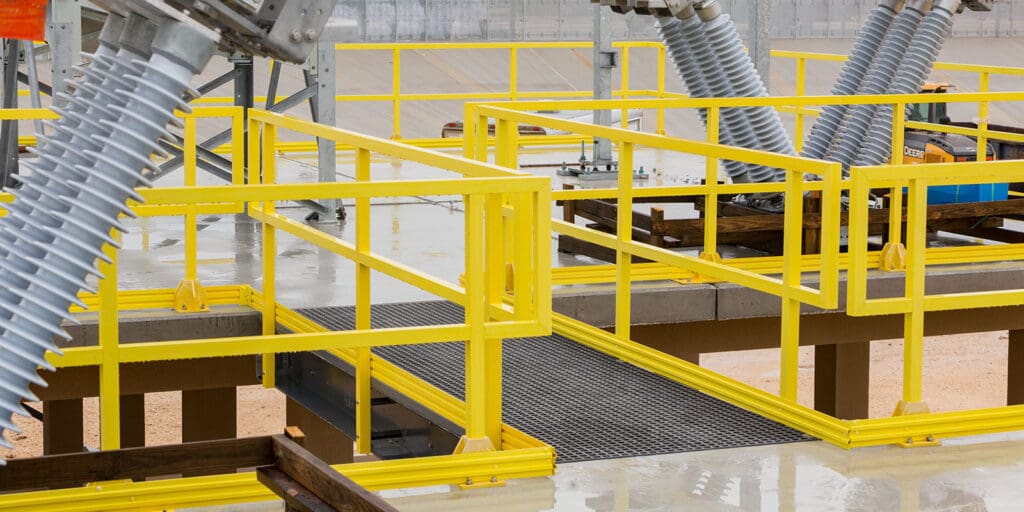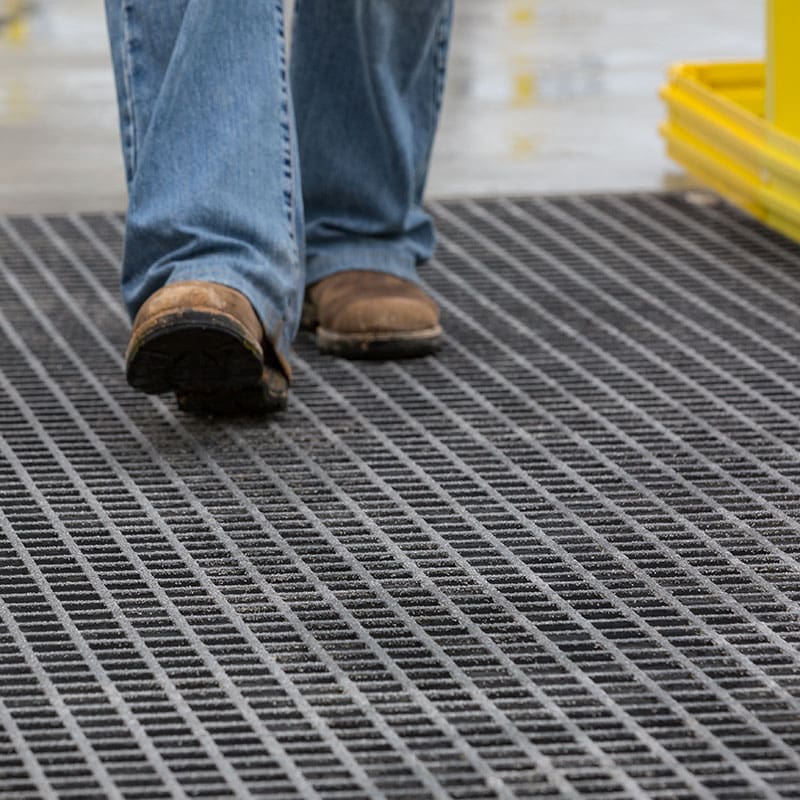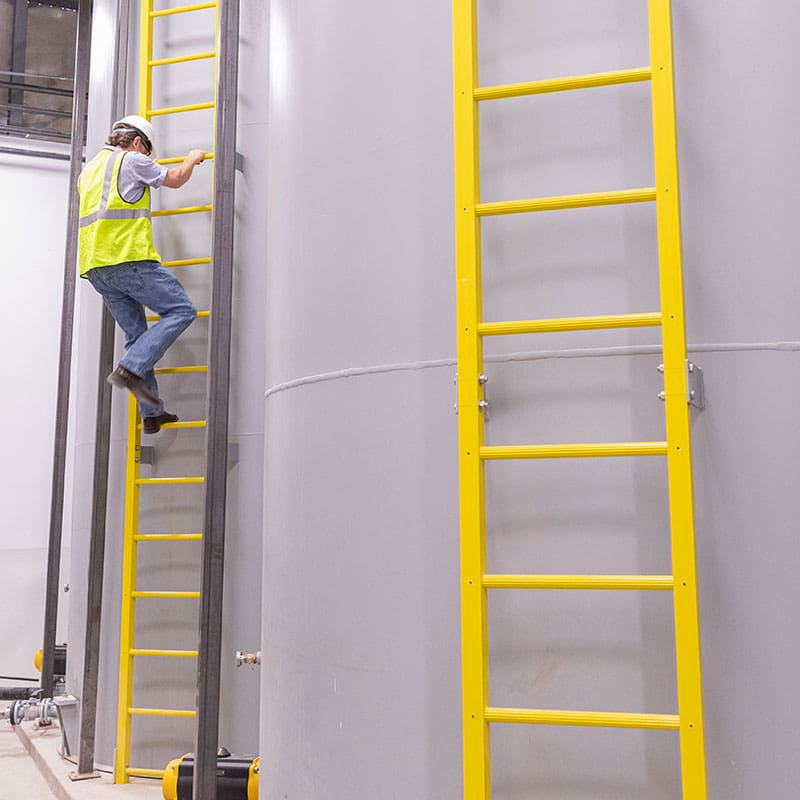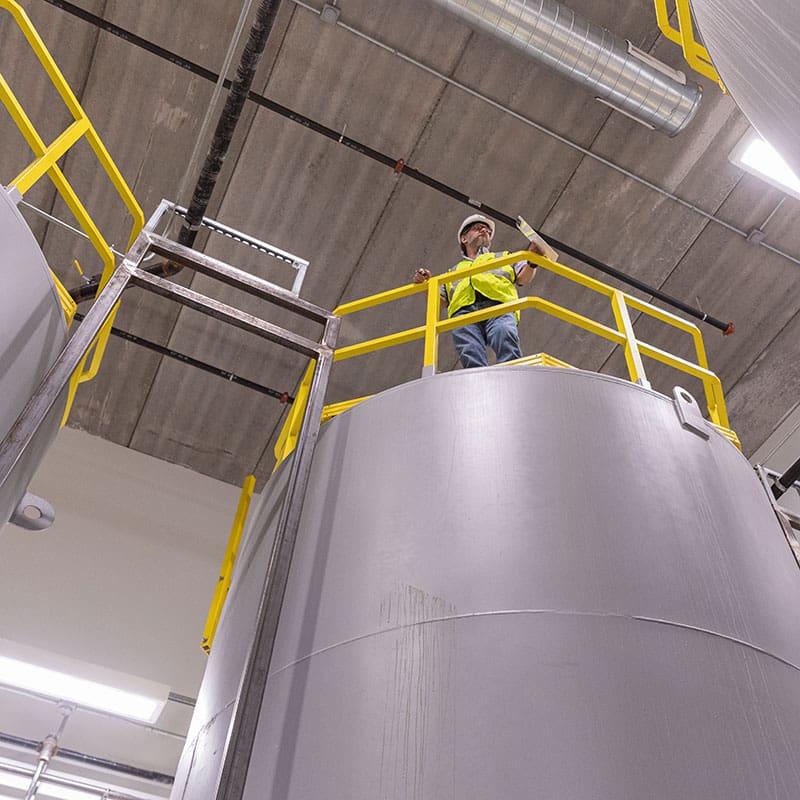At Bedford, we’re committed to helping customers maintain and raise productivity. Because nothing brings work to a halt like safety issues, Bedford not only produces a wide range of industrial plant safety solutions, but our materials are also built to last. That helps ensure that the industrial platforms, walkways, guardrails and more that you add for safety today will be protecting your people, your work areas and your business for years to come.
Bedford industrial plant safety solutions are made from fiberglass-reinforced polymer (FRP), so they’re far superior to other options. Safety systems made of steel or aluminum can fail quickly in an industrial environment or manufacturing facility, becoming hazardous themselves due to weakened joints from corrosion plus dents and scrapes caused by dropped tools and heavy equipment. They also conduct electricity, increasing the risk of injury from electric shocks.
Bedford ReadySeries and PROSeries FRP safety solutions are the opposite. FRP doesn’t rust or corrode. It’s resistant to chemicals and saltwater. It won’t crack or split in high heat or extreme cold. It won’t buckle under heavy weight. It’s impact-resistant, reducing the risk of dents and gouges that can cause tripping hazards. It doesn’t conduct electricity. Its safety yellow coloring is ingrained, so it won’t peel off. The reasons to choose Bedford FRP plant safety solutions for workplace safety go on and on. OSHA recently launched a new initiative focused on preventing and reducing workplace falls. Bedford materials have always met or exceeded OSHA requirements, and you can continue to count on us to stay current with all OSHA regulations.
Stopping Slips, Trips and Falls
An Interview with Aldred D’Souza
Just as important as the material is Bedford’s understanding of real-world conditions and the needs of industrial and manufacturing plant safety managers and personnel. Check out this interview with Bedford’s Engineering Director, Aldred D'Souza, P.E., M.ASCE. D’Souza has nearly 25 years of experience in the FRP industry and is the former chair of the Fiberglass Grating Manufacturers Council. D’Souza is a noted expert on industrial plant safety and often consults with customers on ways to improve workplace safety.

What are the common safety issues you see in industrial plants and manufacturing facilities?
The heart of effective safety in any facility is stopping slips, trips and falls. Often you see that stairs are too steep and the steps are too narrow. That makes it easy to trip, and if you trip on stairs you’re generally going to fall. Serious injuries can be sustained, and it can become catastrophic if the handrail systems are too flimsy. So something that seems simple, like a set of stairs, can be a safety issue if not designed and installed to proper standards and built with ideal safety materials.


What are Bedford’s solutions for improving safety in industrial plants and manufacturing facilities?
Before we talk about any specific products, let’s talk about need. Each facility is unique. They have different sizes, different activities, some have moisture or chemicals, some have extreme heat or cold. So the materials should be selected to fit the safety needs of the facility. That’s why our ReadySeries materials have become so popular. They have the high strength and durability associated with FRP, plus they’re modular and install quickly. That gives plant and safety managers the flexibility they need to get the exact working environment safety solution for the application. They aren’t locked in to trying to make a one-size-fits-all system work or forced to use material like steel that will start corroding almost immediately.
Can you explain what ReadySeries is?
Industrial plant safety is all about keeping people out of harm’s way to protect them as well to avoid any unnecessary shutdowns. ReadySeries is a system of modular safety solutions that can be used to meet specific application needs. The ReadyPlatform line, for instance, provides a range of grating for platforms, walkways and catwalks that enhance workplace safety. ReadyRail meets guardrail and handrail needs. ReadyStair and ReadyLadder materials are used for going up and down safely. In most cases, the different lines are used together, such as a raised walkway that has a ReadyStair system leading up to a ReadyPlatform floor with ReadyRail handrails on the stairs and guardrails on the platform. Everything we do is OSHA compliant, plus we have additional safety features such as slip-resistant surfaces. And, of course, FRP doesn’t conduct electricity. A lot of power flows through industrial plants, so non-conductivity is a big deal.


What is the key to safety in workplace environments?
Obviously, it’s essential to train people on proper safety practices and have emergency exits. In terms of building materials and the layout of safety structures, you first want to route people away from danger. Then you want to be sure that the safety structures themselves are designed to reduce the risk of slips, trips, falls and shocks. Those are the issues that give plant safety managers headaches. That’s why we make sure Bedford materials are anti-skid, dent resistant, corrosion resistant, non-conductive and more. Let’s avoid those headaches and stay productive.
How about designing or repairing workplace environments in terms of safety? What should facility and plant maintenance professionals consider?
Start by thinking through the application. If it’s a platform, what is the load requirement? Are there elevation changes? Will it be exposed to chemicals, movement of heavy machinery, dropped tools or anything that might damage the surface? What dimensions are needed to handle the equipment or foot traffic? That helps inform the platform strength needed, guardrail selection, length of stairs or ladders, and more. I’m really proud of the sales team we have here, because they just don’t want to sell you a handrail or a set of stairs. They want to help you protect your people, so they’ll work with you to get an understanding of your application. Whether you’re replacing a steel system that’s failing or starting fresh, our team can help you with product selection and system design. They’re up to date on OSHA guidelines, too, so you won’t have that worry.
What do EHS professionals need to know about Bedford and FRP materials?
We take safety equipment very seriously. Bedford ReadySeries and PROSeries materials are OSHA compliant, and that’s just the beginning. Steel systems can be OSHA compliant, too, until they corrode and need to be replaced. Our FRP products go through rigorous testing for strength and durability. We also have third-party testing done to verify that we’re meeting our specs. Between the many benefits of FRP and the commitment of our experienced team, EHS professionals can know they’re in good hands with Bedford.
How does an EHS professional or plant safety manager get started?
For more information or to request a quote, contact us or call 814-623-8125. Our team can help you at any stage of your project. If you know what you need, we’ll help you get it as quickly as possible. If you’re right at the beginning and need help with system design, our engineers can help you out. We’re all here to help, so don’t hesitate to reach out.